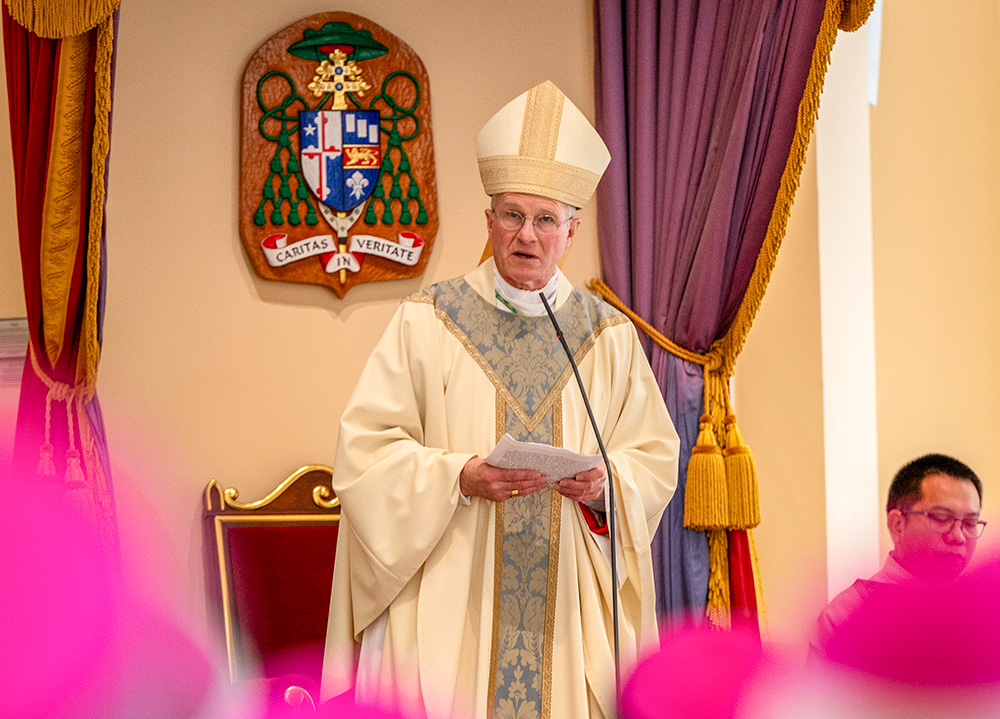
Archbishop Timothy Broglio, president of the U.S. Conference of Catholic Bishops, offers his homily to fellow bishops attending the opening Mass of the bishops' fall plenary assembly Nov. 11, 2024, at the Basilica of the National Shrine of the Assumption of the Blessed Virgin Mary in Baltimore. (OSV News/Catholic Review/Kevin J. Parks)
The U.S. Conference of Catholic Bishops announced on Monday, April 7, "its decision not to renew the cooperative agreements with the federal government related to children's services and refugee support." The decision came after President Donald Trump's administration suspended contracts for refugee resettlement.
Archbishop Timothy Broglio published an op-ed in The Washington Post explaining the "gut-wrenching decision." He recalled the decades of collaboration between the bishops' conference and the federal government and said the conference would not abandon those the government has turned its back on.
"I want to be clear that this decision to end our resettlement agency does not mean walking away from helping refugees and others," said Broglio, president of the bishops' conference and head of the Archdiocese for the Military Services. "Please join us in praying for God's grace, that we might still find generous ways to respond to crises and bring hope where it is most needed."
The budgetary problems at the conference are real. No one expected the new administration's policy changes to be so draconian or so immediate. Still, one can't escape the feeling that the bishops didn't put up much of a fight, did they?
When the Obama administration wrongly decided not to grant sufficient exemptions for religious groups to the contraception mandate, all hell broke loose at the conference. When President Barack Obama offered a compromise, the bishops refused it. The conference then launched a "Fortnight for Freedom" with bulletin inserts distributed nationwide. The bishops set up a special committee on religious liberty and raised the money to fund its work.
Now? An op-ed in the Post. One without a word of specific criticism of the Trump administration's policies that made these cutbacks necessary?
Was there no thought given to meeting with Catholic philanthropists to keep at least some of the work going? Was there any discussion about having an emergency second collection as we do when some disaster strikes? Were bishops scheduled for the Sunday talk shows to make the case for maintaining government contracts with religious groups to help these desperate people?
I understand the bishops' conference is short on funds. Is it also short on imagination?
Advertisement
The announcement was especially painful because it came just as there emerged a human face to the Trump administration's cruelty toward migrants: Kilmar Ábrego García. He is the young man who, by the administration's own admission, was mistakenly deported to El Salvador for detention in that country's Center for Terrorism Confinement, a hellish prison housing inmates in deplorable conditions.
Ábrego García has never been convicted of a crime. He had a work permit. He is married to an American citizen, who says they have a 5-year-old disabled child. The administration alleges he is a gang member, which his lawyers deny. In 2019, a court found he was not a gang member and forbade his deportation.
We have courts in this country to decide whether or not someone is a member of a criminal gang. The administration's claim that it no longer has any jurisdiction in the case is laughable. One phone call from Secretary of State Marco Rubio, and Ábrego García would be released and returned to his family.
The fact that the government can pick someone up off the street without a warrant is precisely the kind of Gestapo-like tactic that differentiates civilized countries that respect the rule of law from totalitarian regimes that trample on people's rights.
Chief Justice John Roberts paused a lower court order requiring the administration to get Ábrego García back by midnight Monday. Trump loyalists shouldn't pop the champagne yet. The last time the Supreme Court issued a stay of a lower court order while it reviewed the disbursement of foreign aid funds, Roberts and Justice Amy Coney Barrett sided with the court's three liberal justices to force the administration to pay the foreign aid contractors that had been stiffed by Trump.
The Supreme Court also lifted a judicial order barring deportations issued by a federal judge in Washington, D.C., but insisted that those being detained have a right to file a habeas corpus motion challenging their detention. As Justice Brett Kavanaugh made clear in his concurring opinion, "The Court's disagreement is not over whether the detainees receive judicial review of their transfers – all nine Members of the Court agree that judicial review is available. The only question is where that judicial review should occur."
As a nation, we are in uncharted territory. As a church, our lodestar is the Gospel, which calls us to protect migrants and refugees. The U.S. bishops' conference can surely bestir itself to do more to fulfill that Gospel call.






